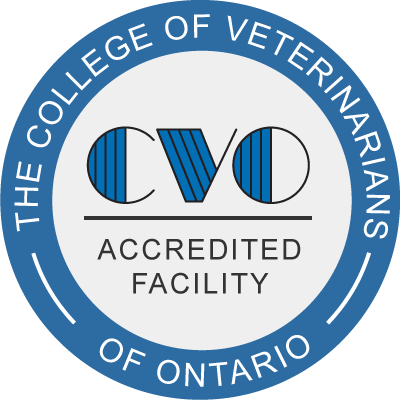Spring is here, and we’d like to take this chance to send you some information on heartworm disease.
OUR PHILOSOPHY:
Although heartworm disease is uncommon in Toronto, it can lead to serious disease and is worth preventing. We see heartworm prevention as extra insurance. For instance we don’t let our dogs (Oscar and Charlie) off leash in any areas that are not fenced in or that are close to traffic, and so the chance of them being hit by a car is very low. However if there was a monthly treatment we could give that ensured they would never be hit by a car, we would definitely use it. Additionally, many current heartworm preventives incorporate protection against gastrointestinal parasites and fleas, which are common in Toronto, and are worth protecting for in their own right.
KEY POINTS ABOUT HEARTWORM DISEASE:
- Heartworms are parasites that are transmitted by mosquitoes. In Toronto we are only concerned about heartworm disease from late spring to early fall.
- Mosquitoes carry the immature larval form of the parasite which is transmitted into the muscle and then bloodstream of a bitten dog.
- It takes 6-7 months for the immature form of the parasite to mature enough to be detectable by a blood test, to be able to reproduce and to become large enough to cause disease in the dog. This is why we do heartworm tests in the spring (starting May 1st).
- A heartworm test is a blood test that is used to detect adult heartworms. We recommend yearly heartworm testing in order to detect infections with adult heartworms as soon as possible, so that dogs can be treated before any physical damage by the adult worms can occur. If the heartworm test is negative than we start the preventive treatments.
- We prevent heartworm infections with monthly treatments of medications that eliminate immature forms of heartworms.
- These heartworm preventives have a 4-6 week retroactive action. This means that if a dog was given a preventive on June 1st, the preventive would eliminate all heartworm larvae that the dog was exposed to in the preceding 4-6 weeks. This is why we start heartworm prevention June 1st, 1 month after the beginning of mosquito season, and end on Nov 1st, the end of mosquito season.
- If the heartworm test is positive, we treat for the adult worms with 3 injections given over a month, and we treat for the immature forms with the preventive products. In heartworm positive dogs we do chest radiographs to determine the severity of disease.
- Less than 20% of infected dogs show clinical signs of disease (coughing, exercise intolerance or difficulty breathing), however in the small percentage of animals showing clinical signs, the disease can lead to serious problems.
Through a combination of monitoring for adult heartworms and using preventive medications through the spring to fall months, we can provide excellent protection against heartworm disease.
Please call us at 416.769.7867 to set up a heartworm test, or ask about it at your next appointment.
In addition to fleas and heartworm disease, our dogs can be exposed to ticks. Ticks are mainly active during the spring and fall, though they can be seen throughout the summer. The ticks themselves are not the concern, but they can carry diseases that can be transmitted to dogs. It takes 24-48 hours for this to occur, so prompt tick removal is an effective way of preventing tickborne disease. Currently tickborne disease is not very common in our region, however studies show ticks are becoming more common and tick prevention is a reasonable course of action. We have oral preventative medications such as Simparica that are very effective and safe for our patients. We can also test for common tickborne diseases along with doing the heartworm test. At this time we feel tick prevention is a reasonable approach in our patients and urge you to discuss any concerns you may have with us.

